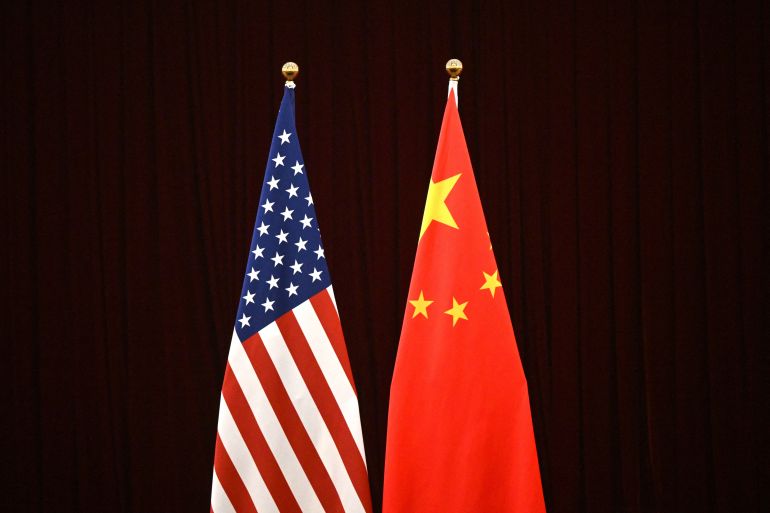Who benefits from US tariffs on Chinese imports? Experts weigh in
While the tariffs are expected to have a negligible impact on the US economy, they are expected to boost President Biden.

The trade war between the United States and China continued this week with its latest salvo – a move that comes amid a heated race for the White House.
On Tuesday, US President Joe Biden announced tariff hikes on imports of various Chinese goods, worth $18bn.
Keep reading
list of 3 itemsUS denounces China’s ‘aggressive’ manoeuvre over South China SeaUS denounces China’s ‘aggressive’ ...
Is China’s economy in serious trouble?Is China’s economy in serious trouble?
Lithium-ion batteries make up $13bn of the total imports, while certain steel and aluminium products, as well as items like medical gloves and syringes, accounted for the remaining $5bn.
Experts say tariffs on these products will likely have limited effects on consumer goods prices and economic growth. The greater gain, they say, may lie at the ballot box, as Biden jockeys for a second term in the White House.
“These tariffs are very much on the margins, and the impacts on the economy will be a rounding error,” Bernard Yaros, lead US economist at Oxford Economics, told Al Jazeera.
While the tariffs do not change much for the US economy, it is still “good politics to do this”, especially during an election year, Yaros added.
Projecting strength
The US is set to hold a presidential vote in November, and Biden is expected to face his predecessor, former Republican President Donald Trump, in a tightly fought race.
Trump has long sought to project a tough-man image, particularly in foreign policy and the economy, while framing his Democratic rival as “weak”. Biden, however, has sought to deflect that criticism by imposing policies that, in some cases, build on Trump’s.
A January paper (PDF) from the National Bureau of Economic Research suggests that tariffs can pay political dividends, even if they do not translate into “substantial job gains”.
The paper looked at the period from 2018 to 2019, when Trump slapped stiff tariffs on China and other countries, targeting products like aluminium, washing machines and solar panels.
It found that residents in US regions that were more exposed to import tariffs became less likely to identify as Democrats and more likely to vote Republican.
The report concluded that voters “responded favourably” to the tariffs “despite their economic cost”, which came in the form of retaliatory tariffs from China.
“Tariffs are good politics, even though the economics don’t work,” Yaros said.
Appealing to the Rust Belt
Biden and Trump are in a neck-and-neck race, with some polls showing the Republican candidate edging out the incumbent in key swing states.

A poll this week from the New York Times, Siena College and the Philadelphia Inquirer, for instance, found that Trump had an advantage in pivotal states like Arizona, Nevada and Georgia.
Biden appeared in one of those states, Pennsylvania, last month to announce his intention to triple tariffs on Chinese steel. Pennsylvania is part of the Rust Belt, a region historically known for manufacturing, and the state itself is famed for steel production.
Brad Setser, a senior fellow at the Council on Foreign Relations, said Biden has also sought to protect other US industries, like its burgeoning electric vehicle (EV) sector.
His new trade rules will ensure that the US cannot directly import EVs made in China, Setser explained.
He added that China has built a competitive EV industry on the back of deep government subsidies and could flood the global and US markets with cheap cars if it was not for such measures.
“China, with its significant auto needs, provided a lot of subsidies to its EV industry that has led to this strength,” said Setser.
“It needs to recognise that the US and Europe will use some of these techniques [of subsidies and tariffs] to build their own industries. It’s unrealistic for China to object to other countries doing the same thing.”
Protecting the American auto industry will also help Biden in the polls. The sector is historically centred in Michigan, another key battleground state where Biden has recently faced backlash.
Michigan is the birthplace of the “uncommitted” movement, which encouraged Democrats to withhold their votes from Biden during the primaries and cast ballots for the “uncommitted” option instead.
The protest was seen as a part of a broader, largely progressive backlash to Biden’s unwavering support for Israel’s war in Gaza.
Looking ahead to November
However, the experts who spoke to Al Jazeera questioned whether Biden’s newly announced tariffs would move the needle at election time.
The US imported $427bn in goods from China in 2023, but it only exported $148bn to the country in return, according to the US Census Bureau.
That trade gap has persisted for decades and become an ever more sensitive subject in Washington, particularly as China competes with the US to be the world’s largest economy.
While the trans-Pacific trade has benefitted both countries – providing cheap goods to American consumers and a large market to Chinese manufacturers – it remains a contentious issue, especially at election time, because of a history of US manufacturing jobs moving overseas.
US politicians have also raised concerns over privacy, as Chinese technology enters the North American market.
Although China has promised retaliation for the latest round of tariffs, experts say it will likely be symbolic as the US tariffs themselves are very targeted.
“We don’t assume the retaliation will be anything disruptive,” said Yaros. “They’re not going to up the ante. That’s not been their MO [modus operandi] in the past when the US has imposed tariffs.”